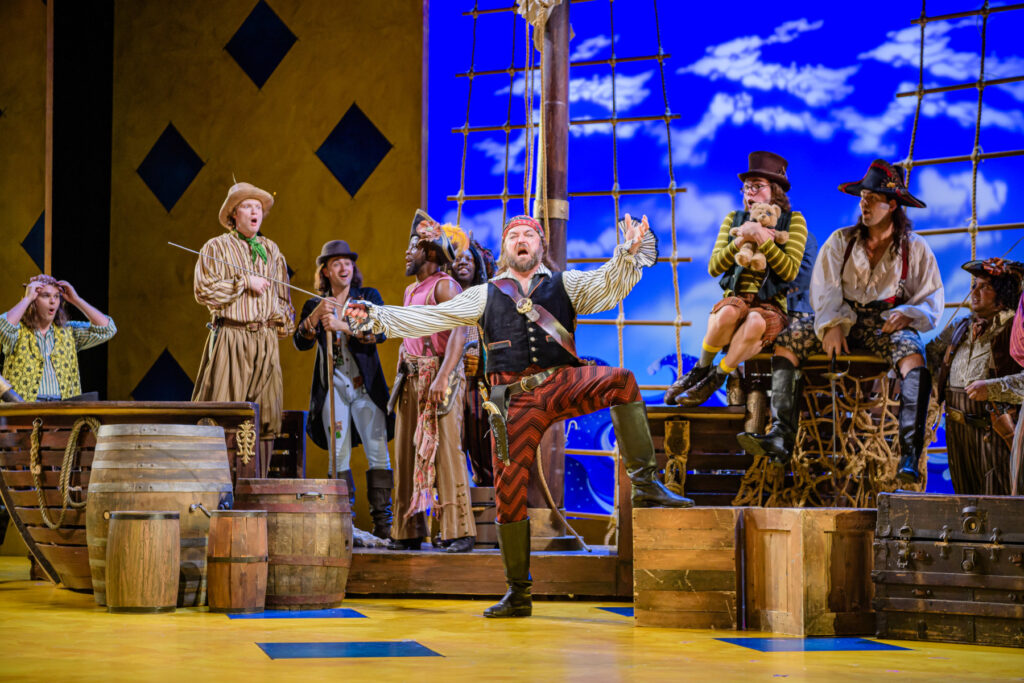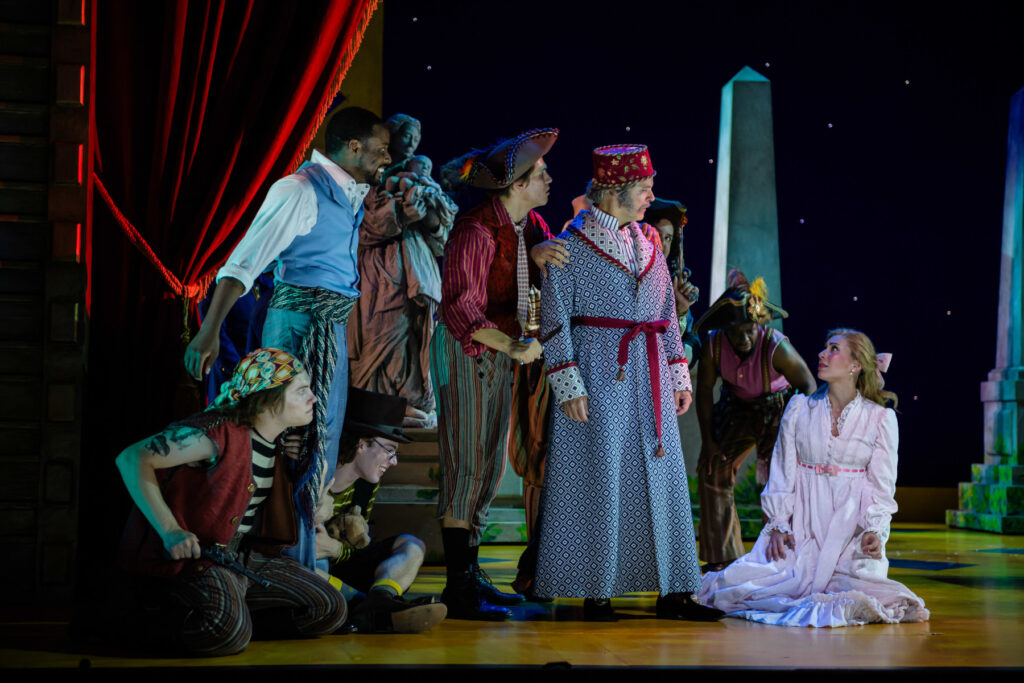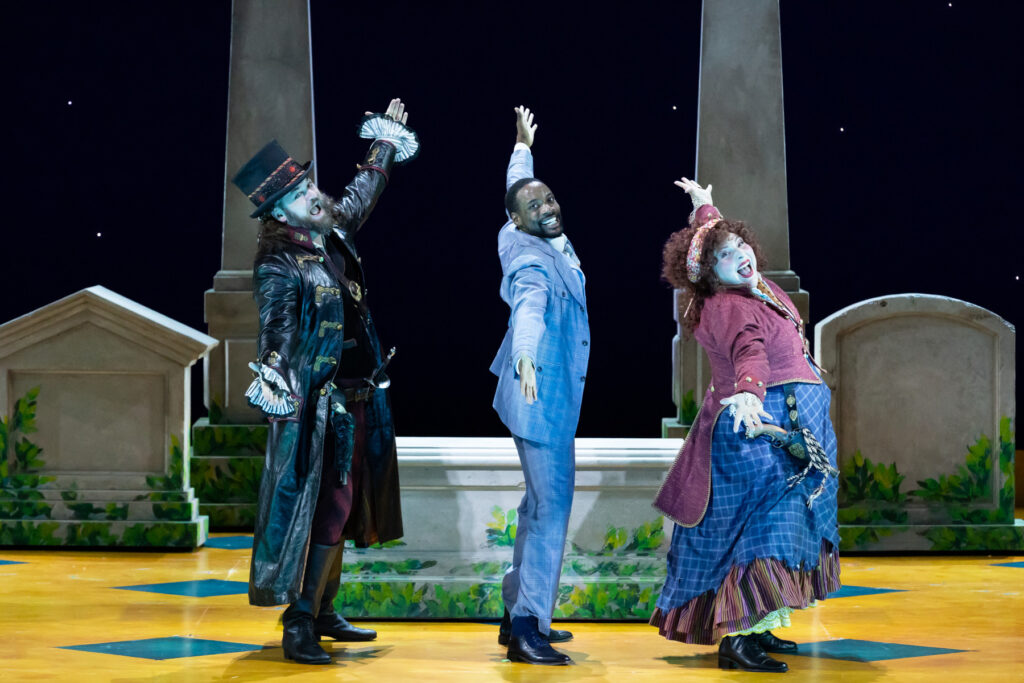Gilbert and Sullivan’s enduring favorite, The Pirates of Penzance, handily captured the hearts of the capacity audience at the Glimmerglass Festival and held them hostage in rapt amusement throughout a fast-paced evening’s entertainment.
From the first downbeat, Joseph Colaneri exerted impeccable stylistic control in the pit, and his musical forces responded with a rock solid rendition of this classic that was top tier from first to last. The excellent Festival Orchestra responded to Maestro Colaneri with sterling ensemble work as well as exceedingly polished solo playing that had admirable suavity one minute, and a sassy sheen the next. This sparking musical achievement spilled over onto the stage, where full-throated, highly polished vocalism was always in evidence, no more so than conveyed by Katherine Kozak’s well prepared chorus.
In a cast that was uniformly fine, perhaps first among equals was Christian Mark Gibbs’ uniquely effective take on Frederic. That Mr. Gibbs is handsome, lithe, and sports a gleaming tenor of purity and poise is a “usual” given for this role. But Gibbs is also an awesome physical comedian, and his inventive and uninhibited antics, including impromptu fey posing, made his interpretation as fresh as a bracing sea breeze and anything but the usual romantic lead cliché. His Mabel, Elizabeth Sutphen matched him for originality and pluck, and her effortless, shining lyric soprano was a constant delight. Ms. Sutphen floated numerous high flying phrases with ethereal beauty, and had a warm appeal throughout the range, but she could put some real starch in her tone when a spitfire delivery was called for. Singly and together, Gibbs and Sutphen created memorable moments, and had a compelling chemistry.

As the Pirate King, Craig Irvin’s wily stagecraft and potent baritone brought authoritative dramatic power to his every scene. Mr. Irvin’s searing vocal presence occasionally had all the menace of Scarpia, but his nuanced coloring and witty phrasing suggested more a domesticated lion. In matters of piracy, baritone Troy Cook threatened to steal the spotlight on more than one occasion with his seasoned, engaging Major General Stanley. Mr. Cook came on like gangbusters with a blazing account of his entrance aria, arguably the world’s most famous patter song. That he successfully encored a chorus at unimaginably breakneck speed, was rewarded with a boisterous ovation in an evening that was rife with them. Cook was not just flash and dazzle, and he deployed his wide-ranging, burnished instrument to fine effect, endowing arching legato phrases with real beauty of mellifluous tone.
The matronly Ruth is often assumed by a character actress, whose acting is more showcased then her singing. The powerhouse mezzo-soprano Eve Gigliotti has turned that conceit on its ear, and her blazing, bountiful vocal production was luxurious. Add to this the fact, that Ms. Gigliotti could create a very interesting journey for her character, and the fact that she could warble so winningly with her tongue firmly planted in cheek, and you have a definitive Ruth.

Bass-baritone Joshua Thomas found the Sergeant of Police to be a fine fit for his imposing sound, and he hurled out his jaunty solos with humor and very good diction. Tshilidzi Ndou’s Samuel was well served by his throbbing, virile baritone and his animated, purposeful stage presence. Saane Aziza Halaholo performed Edith with a rich-toned, ample soprano; Alexandra Sanchez’s Kate was marked by a throbbing, generous mezzo of considerable allure; and Emma Sucato enchanted as Isabel. Mary-Jo Merk had an amusing, stern faced cameo as an imperious Queen Victoria.
James Schuette’s playful set design proved a merry playing environment, and his varied costumes created for Opera Theatre of Saint Louis were colorful, characterful, and joyful. I seem to remember the gold scenic colors punctuated by blue diamond shapes from Saint Louis also, but nonetheless it all seemed spit-polished and spanking new. The rolling pirate ship was a visual treat, and the movable headstones and memorials of the Stanley family resting place were humorously effective. Tom Watson’s fun-loving hair and make-up design was delectably waggish and wig-ish. The estimable lighting designer Robert Wierzel did not disappoint, his bright, sunny, vibrant color washes of Act I effortlessly morphing into shadowy blues and greens of the amusingly moodier Act II.

Seán Curran’s masterful direction and sprightly choreography were up to his usual esteemed standard. The synchronized gestures, imaginative business, well-modulated transitions between set pieces, and meticulously coordinated crowd control were notable for their flawlessly rehearsed accuracy and infectious lunacy. The penguin-waddling Keystone Kops evoked by the policemen’s chorus was especially daffy and well-synchronized. If the moderately stilted declamatory style of the spoken lines sometimes verged on a hint of prosciutto crudo, there is no doubt that the enthusiastic audience was eating it all up like a succulent “ham on wry.”
The Pirates of Penzance is very deliberately, and lovingly calculated to tickle even the most resistant funny bone. If you were not similarly impressed, I just may have a (funny) bone to pick with you! Radiant music, sparkling physical production values, a star quality outing from every character, this Pirates is everything a true “festival” performance should be.
James Sohre
The Pirates of Penzance
Music by Sir Arthur Sullivan
Libretto by W.S. Gilbert
Major General Stanley: Troy Cook; The Pirate King: Craig Irvin; Frederic: Christian Mark Gibbs; Mabel: Elizabeth Sutphen; Ruth: Eve Gigliotti; Sergeant of Police: Joshua Thomas; Samuel: Tshilidzi Ndou; Edith: Saane Aziza Halaholo; Kate: Alexandra Sanchez; Isabel: Emma Sucato; Queen Victoria: Mary-Jo Merk; Conductor: Joseph Colaneri; Director and Choreographer: Seán Curran; Set and Costume Design: James Schuette; Lighting Design: Robert Wierzel; Hair and Makeup Design: Tom Watson; Chorus Master: Katherin Kozak
All photos by Sofia Negron courtesy of The Glimmerglass Festival.